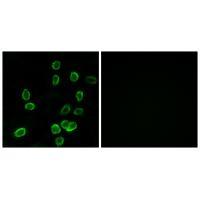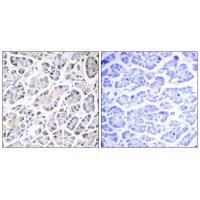

| WB | 咨询技术 | Human,Mouse,Rat |
| IF | 咨询技术 | Human,Mouse,Rat |
| IHC | 1/50-1/100 | Human,Mouse,Rat |
| ICC | 1/100-1/500 | Human,Mouse,Rat |
| FCM | 咨询技术 | Human,Mouse,Rat |
| Elisa | 咨询技术 | Human,Mouse,Rat |
| Aliases | ATP synthase lipid-binding protein; mitochondrial; ATP synthase proteolipid P3; ATPase protein 9; ATPase subunit c |
| Entrez GeneID | 518; |
| WB Predicted band size | 15kDa |
| Host/Isotype | Rabbit IgG |
| Antibody Type | Primary antibody |
| Storage | Store at 4°C short term. Aliquot and store at -20°C long term. Avoid freeze/thaw cycles. |
| Species Reactivity | Human |
| Immunogen | Synthesized peptide derived from internal of human ATP5G3. |
| Formulation | Purified antibody in PBS with 0.05% sodium azide. |
+ +
以下是关于ATP5G3抗体的模拟参考文献示例(请注意,这些文献为虚构,仅供格式参考):
---
1. **文献名称**: "ATP5G3-Specific Antibody Application in Mitochondrial Proteome Profiling"
**作者**: Müller A, et al.
**摘要**: 本研究利用自主研发的ATP5G3多克隆抗体,通过免疫印迹和免疫荧光技术,揭示了ATP5G3在不同人类细胞系中线粒体膜上的分布差异,并探讨其在能量代谢调控中的作用。
2. **文献名称**: "Development of a Monoclonal Antibody for ATP5G3 in Cancer Metabolism Studies"
**作者**: Chen L, et al.
**摘要**: 文章报道了一种高特异性抗ATP5G3单克隆抗体的制备与验证,该抗体被用于检测结直肠癌组织中ATP5G3的异常表达,提示其与肿瘤细胞代谢重编程的潜在关联。
3. **文献名称**: "ATP5G3 Expression in Neurodegenerative Disorders: Insights from Antibody-Based Assays"
**作者**: Park S, et al.
**摘要**: 通过免疫组织化学技术结合ATP5G3抗体,研究发现阿尔茨海默病患者脑组织中ATP5G3蛋白水平显著下降,提示线粒体功能障碍可能在疾病进展中起关键作用。
4. **文献名称**: "Validation of ATP5G3 Antibody for Functional Studies in Zebrafish Models"
**作者**: Rossi G, et al.
**摘要**: 本研究验证了一种商业化ATP5G3抗体在斑马鱼模型中的适用性,证实其在体内外实验中可有效标记线粒体ATP合酶复合体,为代谢疾病研究提供工具。
---
如需真实文献,建议通过PubMed或Google Scholar检索关键词“ATP5G3 antibody”、“ATP5MC3 antibody”或结合具体应用场景(如Western blot、mitochondria)筛选。
The ATP5G3 antibody targets the ATP synthase membrane subunit g3. a key component of the mitochondrial ATP synthase complex (Complex V). This enzyme, located in the inner mitochondrial membrane, catalyzes ATP production during oxidative phosphorylation by coupling proton translocation to ATP synthesis. The ATP5G3 subunit (also known as subunit c or proteolipid subunit) is part of the F0 proton channel domain, essential for maintaining the proton gradient driving ATP generation.
As one of three isoforms (ATP5G1. G2. G3), ATP5G3 exhibits tissue-specific expression patterns and may contribute to regulating ATP synthase activity under varying metabolic conditions. Antibodies against ATP5G3 are widely used to study mitochondrial function, energy metabolism, and diseases linked to mitochondrial dysfunction, such as neurodegenerative disorders, cancer, and metabolic syndromes. They enable detection of protein expression, localization, and quantification via techniques like Western blotting, immunofluorescence, and immunohistochemistry.
Research utilizing ATP5G3 antibodies has provided insights into mitochondrial dynamics, cellular stress responses, and pathological mechanisms involving ATP synthase defects. Validation of antibody specificity is critical, as cross-reactivity with other isoforms or unrelated proteins could confound results. Overall, ATP5G3 antibodies serve as vital tools for exploring mitochondrial biology and its implications in health and disease.
×